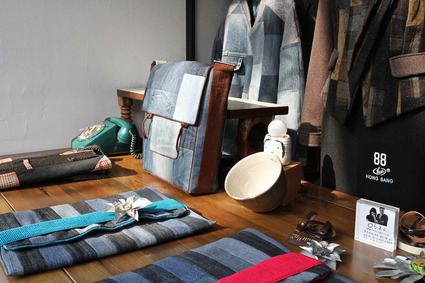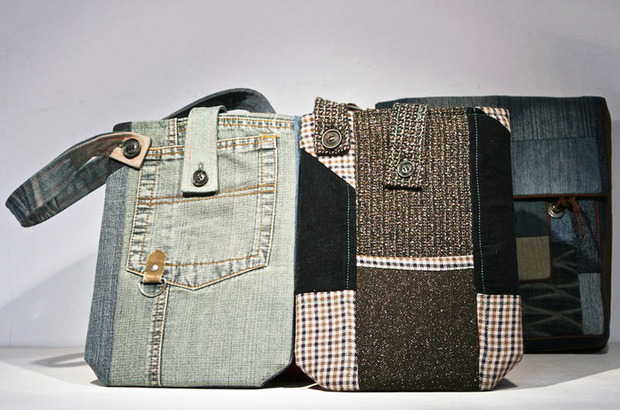Interview: Nathan Zhang
We talk to the Beijing-based founder of Brandnü about his upcycled fashion operation


Waste is one of the dark sides of development, especially in fast growing-country like China, and Beijing is no exception. With massive urbanization bringing crowds of mostly unskilled rural workers to the city and a literal ring of garbage dumps and unauthorized recycling centers besieging the capital, it’s often difficult to see the few making a positive impact in their community. Fully aware of these issues, designer Nathan Zhang has gone beyond recycling to come up with an unconventional solution in his own field. With his label Brandnü and the Upcycle Project he has managed to build a virtuous circle involving professional designers, migrant women, charity activities and fine handcrafts.
In Wudaoying Hutong, a refurbished alley of old Beijing that’s fast becoming a popular hotspot for local trendsetters and expat crowds, Zhang set the base for his many activities. This is where we recently caught up with him to talk about his shop and discover more about Brandnü.

Secondhand and social enterprises are not something you see very often in China, how did you have the idea to start Brandnu?
I started three years ago when I moved back to China from Canada, where I was a project manager for a telecommunication company. I really wanted to do something to promote Chinese handcraft and to work with rural or migrant women. I have a friend, professor Wu, who’s a founder of a skills training center for rural women. She is 70 years old and my wife was really inspired by her. On the other hand we had many friends who are designers and we thought that maybe there was a way to build a connection between them.
Moreover I wanted to open a shop, a secondhand shop, like in Canada there are Goodwill shops, but in Beijing we don’t have such thing. So I opened my Brandnü shop and I started taking secondhand donations, clothes and stuff, working with rural women and selling their crafts and just afterwards I decided to do my own products.

Your Upcycle project involves garbage collectors, designers, migrant workers and rural women, how did you manage to build this virtuous circle?
At the beginning I was sourcing only clothes from the the migrant workers’ community. There are a few shops in the outskirts of Beijing and just about 60% of what they have is still wearable, all the rest is sold by weight and it’s like garbage for them, sold for five yuan per kilo. I was pretty amazed myself and then I had a friend who’s a well-known fashion designer, and she said, “Oh my God they have so much good stuff,” and we both loved so much of that ’90s style, we were just like, “Wow! We should do something together with that, maybe we can use secondhand clothes to make new things.” That was last April. She designed some models and we wanted to involve migrant women in the process.
The problem was that they could fix old clothes but they didn’t really have strong tailoring skills. Finally one day I had the inspiration, and I thought that if we just cut the old clothes, we could simply work with the fabric and do some patchwork. I contacted more designer friends, a whole bunch of different people, and now I have a team of five or six designers I split the profit with. Along with the clothing there are some accessories like bags made by migrant woman, since they don’t require really good sewing skills. At the same time this year, by collecting secondhand clothes and reselling them, we managed to raise money for a rural women’s organization and fund sewing classes in Guizhou Province.

How do you manage to get in touch with rural women, to get them involved in your project?
I got in touch with the migrant female community because I’ve been donating clothes to them, I knew some rural women when I built a literacy class organization and we also raised money to build a rural women’s library. We got the funding from some international private schools in Beijing and we created this library in Beijing, where women can find a lot of books about women’s health, raising kids etc. but they can also use the space to gather and do different things, to relax, play mahjong together and things like that.
Anyway it’s not always easy to gain their trust. At the beginning they didn’t believe I could do any good for them, they thought I was just talking too much because I was young, but when they saw the real money they were shocked.
For more information on Brandnü visit them online. Images by Alessandro De Toni.












